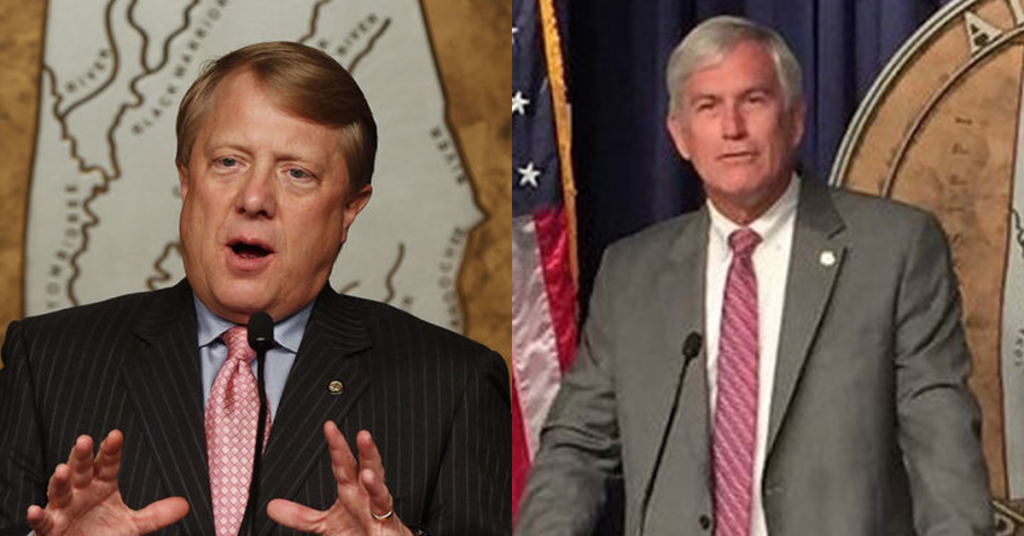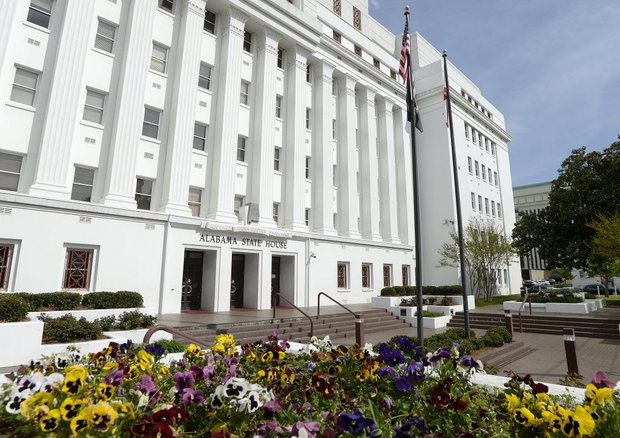Here’s everyone the NRA has endorsed in the 2018 election cycle

An endorsement from the NRA‘s Political Action Committee, the NRA Political Victory Fund (NRA-PVF), can be a game changer for many candidates. “When provided with the facts, the nation’s elected officials will recognize that “gun control” schemes are an infringement on the Second Amendment and a proven failure in fighting crime” says the fund. “The importance of this premise lies in the knowledge that, as one U.S. Congressman put it: ‘The gun lobby is people.’” The NRA-PVF makes its decisions based on voting records, public statements and their responses to their NRA-PVF questionnaire. Here are the candidates who the NRA has endorsed, who they believe will stand up for Alabamian’s Second Amendment rights: Statewide races Governor: Kay Ivey Attorney General: Steve Marshall Agricultural Commissioner: Gerald Dial State Senate Races District 4: Paul Bussman District 6: Larry Stutts District 8: Steve Livingston District 10: Mack N. Butler District 12: Del Marsh District 21: Gerald H. Allen District 22: Tom Butler State House Races District 10: Mike Ball District 12: Corey Harbison District 14: Tim Wadsworth District 16: Kyle South District 22: Ritchie Whorton District 23: Tommy Hanes District 31: Mike Holmes District 33: Ronald G. Johnson District 45: Dickie Drake District 48: Jim Carns District 49: April Weaver District 65: Elaine Beech District 88: Jeremy Arthur District 105: Chip Brown
Ala. State Sens. Dick Brewbaker, Paul Bussman resign from Republican Caucus

Montgomery State Sen. Dick Brewbaker has resigned from the Alabama Senate Republican Caucus. The two-term Republican, who announced in November he does not plan to seek re-election in 2018, resigned Friday to protest the way various lottery proposals have been handled in the current special session of the Alabama Legislature. Monday, Brewbaker said he assumes his resignation means he will lose his seat as chairman of the Senate Education and Youth Affairs Committee. Brewbaker was joined by Cullman State Sen. Paul Bussman. Both lawmakers have said they remain Republican, but have sent formal letters to Senate leadership withdrawing from the majority caucus. “In order for the Alabama Senate to operate fairly, we have set rules by which all members must abide,” Bussman said in a Facebook post Tuesday explaining his resignation. “This organized process is crucial to a fair and transparent government. It is when these rules are not followed that the breakdown of the system occurs. The process broke down last week when these rules were violated. These rules cannot be used when convenient and discarded when it is inconvenient.” Bussman continued, “I can no longer sit back and ignore the actions of the Alabama Senate Republican Caucus leadership which are misguided, unequally applied, punitive and divisive. As a result, the caucus has made a significant shift in priorities since 2010. In order for us to be successful in Alabama, we cannot return to the old ways of doing business. We are expected to do better and we must do better.” Despite the defections, the GOP will still hold the supermajority in the Alabama Senate with 24 members. There are only eight Democrats and one independent.
Alabama legislative preview: May 3 — May 4, 2016

Two days. That’s all Alabama’s state lawmakers have to complete their legislative priorities for the year. Some bills will end up languishing in the annals of Alabama history, while others will get their day on the governor’s desk. The entire session has been covered in the grey cloud of scandal, between accusations of Gov. Robert Bentley‘s infidelity, and the impending ethics trial of Speaker Mike Hubbard, but legislators stayed on track … mostly. Some much-debated bills like the gas tax are dead for good this year, while others, like payday lending reform and industrial hemp legalization, are walking a blade-thin line to final passage. Here is what legislators have on their plate for the final two days of the 2016 Regular Session. Here is what legislators have on their plate for the final two days of the 2016 Regular Session. House — Convenes Tuesday at 1 p.m. SB372 creates a new provision in Alabama’s controversial “chemical endangerment of a child” law, allowing the consumption of controlled substances under the “good faith” supervision of a physician. The chemical endangerment law came under fire last fall after a searing investigation by AL.com and ProPublica. Sponsored by Sen. Clyde Chambliss (R-Montgomery) in the Senate and Rep. April Weaver (R-Alabaster) in the House. SB91 regulates Payday Lenders, restricting the interest rates and fees they may charge. The bill being considered in the House Tuesday is a watered-down version of one passed by the Senate in early April. Should it pass the House it would have to be reconsidered by the Senate in the waning hours of the Session on Wednesday. Sponsored by Sen. Arthur Orr (R-Decatur) in the Senate and Rep. Danny Garrett (R-Trussville) in the House. SB268 Currently, an inmate’s eligibility for Medicaid is terminated once they are incarcerated. SB268, already passed by the Senate, would change that termination to a suspension. The bill’s sponsors argue this will help reformed convicts land back on their feet when their sentences are complete. Sponsored by Sen. Cam Ward (R-Alabaster) in the Senate and Rep. Chris England (D-Tuscaloosa) in the House. SB347 which would give the Department of Agriculture and Industries the authority to study, regulate, and tax industrial hemp, and reclassify the plant as separate from marijuana. Similar bills have been passed previously in both the House and Senate, but because they weren’t identical they must be considered again. Sponsored by Sen. Paul Bussman (R-Cullman) in the Senate, and Rep. Ken Johnson (R-Moulton) in the House. Senate — Convenes Tuesday at 1 p.m. HB204 reorders the names appearing on primary ballots in presidential election years to present elected official positions first, and delegates to the national convention last. Currently, the delegates come directly after the presidential candidates themselves, an arrangement found to be confusing for many primary voters, as they had to sift through a litany of names they didn’t recognize to find the candidates for federal and state offices. Sponsored by Rep. Randy Wood (R-Saks) HB393 is the House version of the industrial hemp bill described above. HB433 prohibits a sexually exploited child from being “adjudicated, delinquent or convicted of a crime of prostitution.” Essentially, the bill protects children who are victims of sexual crimes or trafficking from being convicted of prostitution. The bill’s sponsor is a longtime advocate for harsher penalties for sex traffickers, and has fought to protect the victims of the deplorable practice. Sponsored by Rep. Jack Williams (R-Vestavia Hills) HB98 allows qualifying retirees from the U.S. Military to obtain concealed weapons permits from their county’s sheriff at no cost to them. The Sheriff may revoke the permit if cause is found. Sponsored by Rep. David Standridge (R-Hayden)
Alabama Legislature approves bills legalizing industrial hemp

The Alabama Senate overwhelmingly passed SB347 Tuesday evening, a bill legalizing the research and regulation of industrial hemp—the non-intoxicating version of the cannabis plant. A similar, but not identical, bill passed the Alabama House earlier in the day. “There is enormous economic potential for the use of industrial hemp, which can be used in the production of insulation materials, yarns, textiles, and auto parts,” said the bill’s sponsor, Sen. Paul Bussman, a Cullman Republican. “This proposal will allow our colleges and universities to investigate industrial hemp’s full potential. I believe industrial hemp could be a huge benefit to our Alabama’s agriculture, but I’m glad we’re taking this initial step approving research before we consider legalization for economic production,” Should either house adopt the other’s version of the bill, and it is signed by Gov. Robert Bentley, Alabama will become the 29th state to legalize the cash crop. The bills would allow the state’s colleges and universities to research the plant and its properties, and allow the Department of Agriculture and Industries to license growers in the state. Any revenues from the licensing and taxing of industrial hemp would be earmarked for the Department of Agriculture. The Department’s commissioner, John McMillan, celebrated the bill’s passage in a press release. “I want to commend Senator Bussman for his leadership on this issue and for his willingness to seek alternative cash crops for Alabama farmers,” said McMillan. “We look forward to the potential research opportunities this legislation provides our state institutions of higher education.” In their support of the bill, Sen. Bussman and the House version’s sponsor, Rep. Ken Johnson, cited a white paper written by Auburn University detailing the plant’s uses in the creation of food, fuel, in textiles, and other raw materials. The white paper also found the crop grows well in all of the Yellowhammer State’s soils in climates, and requires the use of few pesticides or fertilizers, making it an attractive and inexpensive commodity for Alabama’s many farmers.
Alabama legislative preview: April 11 – April 15, 2016

Alabama legislators will return to Montgomery this week to continue the 2016 regular session. The House will convene at 1pm on Tuesday, April 12th, while the Senate will convene at 4pm. This week the House will consider: HB393, which would give the Department of Agriculture and Industries the authority to study, regulate, and tax industrial hemp, and reclassify the plant as separate from marijuana. Sponsored by Ken Johnson (R-Moulton) The Senate version, SB347, is sponsored by Sen. Paul Bussman (R-Cullman) HB218, an effort to require cursive handwriting skills to be taught by the end of the third grade year to “to prepare him or her to enter the world of work and/or to complete course work at the postsecondary level.” Sponsored by Dickie Drake (R-Leeds) HB2, or the “Kelsey Smith Act”, which would require wireless communications service providers to give location information to law enforcement agencies upon request in an emergency situation involving a risk of death or serious bodily harm. Sponsored by Tommy Hanes (R-Scottsboro) The Healthcare Costs sub-committee will meet Tuesday at 10am in room 418 to consider HB158, the Child Care Provider Inclusion Act, which would prohibit the state from discriminating against a child care service provider on the basis that the provider declines to provide a child care service that conflicts with the religious beliefs of the provider. HB158 is sponsored by Rep. Richie Wingo (R-Tuscaloosa) The Senate has yet to publish its special order calendar, but this story will be updated when it becomes available.
Alabama legislative preview: April 4 – April 8, 2016

Legislators return to Montgomery this week after their spring break, with the House of Representatives convening at 1 p.m. and the Senate an hour later Tuesday. In the Senate, lawmakers are slated to take up SB342 from Sen. Vivian Figures (D-Mobile), which would make the transmission of an explicit message a Class A misdemeanor. The body will also take up SB347 from Sen. Paul Bussman (R-Cullman), which would legalize the manufacturing of industrial hemp in the state. The Senate will also take up SB14 from Sen. Gerald Allen (R-Tuscaloosa), which would allow citizens to carry a pistol in a vehicle without a permit. Over in the House, lawmakers will take up two alcohol-related bills: HB46 from Rep. Alan Boothe (R-Troy) would allow Alabama distilleries to sell their product for off-premise consumption and HB83 from Rep. David Faulkner (R-Birmingham) would allow state wineries to establish an off-site tasting room. On Wednesday, committee hearings will get underway. At 1 p.m. in room 325 of the state house, the Senate Judiciary Committee will take up the grandparent’s visitation rights bill, HB334 from Rep. Mike Jones (R-Andalusia), as well as HB115 from Rep. Paul Sanford (R-Huntsville), which would decriminalize possession of the marijuana-based, seizure-reducing medication CBD oil. At 1:30 p.m in room 727 at the state house, the Senate Rules Committee will take up SB97 from Sen Gerald Dial (R-Lineville), which would allow the Ten Commandments to be displayed on state property and at public schools. At 9 a.m. in room 429 of the state house, the House Health Committee will take up HB183 from Rep. Kerry Rich (R-Guntersville), which would require abortion providers to conduct a sonogram before providing an abortion. At 1:30 p.m. in room 418 of the state house, the House Committee on Education Policy will take up HB299 from Rep. Ed Henry (R-Decatur), which would prohibit local school boards from adopting or enforcing “zero tolerance” policies regarding drugs, alcohol, weapons or physical harm to another person. The bill would also require that the definition of firearm be “narrowly construed.”
Conservative legislators ask colleagues to “Stop the Gas Tax”

https://www.youtube.com/watch?v=llTMdXbnZ-s&feature=youtu.be In a video published on Rep. Will Ainsworth‘s YouTube account, several conservative Republican state legislators proclaim their opposition to a proposed fuel tax increase currently making its way through the state legislature. The bill, sponsored by Rep. Mac McCutcheon, would raise the gasoline tax by 6 cents per gallon initially, but could be reassessed every four years to be adjusted to equal the average of Alabama’s neighboring states. In the video, published Thursday, Reps. Ainsworth, Mike Holmes, Phil Williams, Arnold Mooney, Ed Henry, Allen Farley, and Mack Butler join with Sens. Bill Holtzclaw, Paul Bussman, Paul Sanford, and Phil Williams to express their disapproval for the legislation. Ainsworth was the only member of the House Transportation, Utilities and Infrastructure Committee to vocally dissent to the bill in committee when it was overwhelmingly passed with a voice vote. Proponents of the bill, including Jeremy L. Arthur, the president and CEO of the Chamber of Commerce Association of Alabama, and William J. Canary, president and CEO of the Business Council of Alabama, say the increased tax is a much-needed investment in the state’s infrastructure and ability to recruit jobs and businesses. Ainsworth maintains that he isn’t arguing the importance of infrastructure spending, but believes Alabama should get its fiscal house in order first. “No one argues the importance of infrastructure spending in Alabama,” he said in the video. “However, before we look at that we need to cut waste, reduce the size of government, and look at best practices in other states.” Other opponents of the legislation made a similar argument, citing the state’s unusual budgeting process, as well as the high number of government employees. “Why should we raise the Alabama gas tax when we already transfer $63.5 million away from the Department of Transportation to support other government services?” Sanford said. “I don’t see how we can talk about raising fuel tax at the gas pumps when for a number of years, there have been several of us at the State House have tried to get a conversation going about looking at our 91-94 percent earmarked budgets,” Farley said. “Alabama is seventh in the nation in full-time employment, both state and local, that is not education. We need to deal with the size of government, and cut it.” The legislature will likely take up the bill when it returns from spring break on Tuesday.
Child welfare bills waiting in Alabama statehouse

In his recent op-ed for Alabama Today, adoption advocate Sam McClure expressed doubt that lawmakers would have time to pass child welfare legislation this session. Indeed, as the 2015 Legislative Session draws to a close, some measures introduced by lawmakers have not yet had a final vote: Rep. Mac McCutcheon filed a bill to establish an Office of the Ombudsman for Child Welfare. Under House Bill 48, the Ombudsman would conduct independent investigations of complaints on actions taken by the state in child welfare or reunification plans. The Ombudsman would also send the Governor regular reports on the conditions in group homes and other institutions for juveniles. The House committee on public safety gave House Bill 48 a favorable report in April, but so far the measure has not been called to the House floor for a vote. The House health committee has yet to vote on a bill from Rep. Mack Butler that would clarify when and how medical workers report suspicions that a child has been exposed to illegal drugs. House Bill 408 says that those suspicions should be reported orally to law enforcement within two hours, even if medical test results aren’t yet available. Once medical tests confirm that a child has been chemically endangered, the health worker should file a written report with law enforcement, according to HB408. Senate Bill 461, sponsored by Sen. Paul Bussman, says that if a parent has allowed their child to be near a methamphetamine laboratory “or a location where illegal drugs are stored, kept, packaged, diluted, or manufactured”, the Department of Human Resources has no obligation to try to preserve that parent’s custodial rights. The Senate health and human services committee voted unanimously in favor of the bill last week. Under Senate Bill 494 out-of-state relatives to a child in DHR custody have six months to tell the department they would like to be appointed guardian. After that time, DHR staff will not be required to consider those relatives when they makes custody decisions. Sen. Bussman filed SB494 on Thursday and the bill has been referred to the Senate Committee on Education and Youth Affairs. As lawmakers move quickly to enact legislation before Sine Die, Alabama Today will follow these bills and report on their progress.


